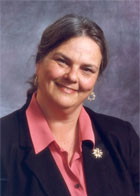In 32 years of teaching at Berkeley Law, professor Marjorie Shultz ’76 has yet to develop even the slightest trace of burnout or complacency. Her  commitment to students—and her ability to inspire them—has been recognized with the Rutter Award for Teaching Distinction.
commitment to students—and her ability to inspire them—has been recognized with the Rutter Award for Teaching Distinction.
“The central thing for me is to generate as much direct engagement as I can with students about their reasoning process,’’ says Shultz, who will receive the award April 22 during a 3 p.m. ceremony and reception at the Bancroft Hotel. “I’ve always felt that you don’t solely teach content, you teach students, and I try to get them accustomed to seeing an issue from many points of view.”
Each year, the Rutter Award honors a law professor who has demonstrated an outstanding commitment to teaching. It was established at Berkeley Law in 1995 by William Rutter, a philanthropist, lawyer, educator and author who has been part of the legal profession for more than 50 years. Shultz received the UC Berkeley Distinguished Teaching Award in 1983, and in 2000 she won the Society of American Law Teachers’ Achievement Award for her contributions to legal education and equality.
“I’ve made a number of changes in the particulars of how I teach, but generally the core methodology has stayed the same,” says Shultz. “I’ve always prided myself on being able to involve a first-year contracts class with more than 100 students just as well as a health law seminar with 20 students.”
Not Teaching By the Book
In her first-year courses, Shultz applies contract law to atypical areas such as family and reproductive law. In addition to rigorous Socratic analysis and discussion, she assigns video advertisements to explore concepts such as offer and acceptance, one of the oldest principles of contract law.
Where appropriate, Shultz also makes “a significant effort” to introduce issues of class, race and gender. “I’m always trying to get students not simply to learn a rule and reason about it,” she says, “but to understand where the rule came from, how it operates, and what its implications are.”
In her upper-level courses, students take responsibility for much of their class work by choosing projects and working to develop their own views on a problem from practical, theoretical, ethical and judicial vantage points. “By their third year, I think students have the capacity and need to be challenged by something more than sitting in a classroom taking notes,” Shultz says.
For example, one student is researching how American law affects hospitals on the U.S.-Mexico border that often take patients across the border rather than treat them. Others examined AIDS prevention and treatment in the Pacific Islands; researched and presented presidential candidates’ positions on health care reform; assessed legal and medical issues in response to the birth of an intersex child; and analyzed restrictions on access to pharmaceuticals before FDA approval.
A Full Plate
Shultz is co-director of the Berkeley Stem Cell Center’s California Institute for Regenerative Medicine Law Scholars program and sits on several health and research boards and committees. She has authored many articles on medical research, informed consent, and health care law, as well as commentaries on the intersection of contracts, feminism and family issues. Shultz also speaks and consults on legal issues in health care law and ethics, and on cases that deal with reproductive technology, obligations of health care organizations, and consumer contracts.
Recently, she has conducted research for a Law School Admissions Council project that seeks to develop predictors of attorney success—which could potentially be used in law school admissions decisions. Results of this 10-year theoretical and empirical study, which aims to predict actual lawyering performance rather than student performance in law school, will be published over the next 6-12 months in multiple papers directed to various audiences.
But even with her busy schedule outside the classroom, educating and engaging students remains a top priority.
“I’ve enjoyed teaching my entire career,” says Shultz. “The material evolves enough that you’re constantly bringing in new viewpoints. In health law, for example, issues like non-traditional marriage and assisted reproduction move the subject matter forward. Then, too, it never gets boring because every year you’re teaching different students with different viewpoints, insights, experiences, and challenges.”
— By Andrew Cohen